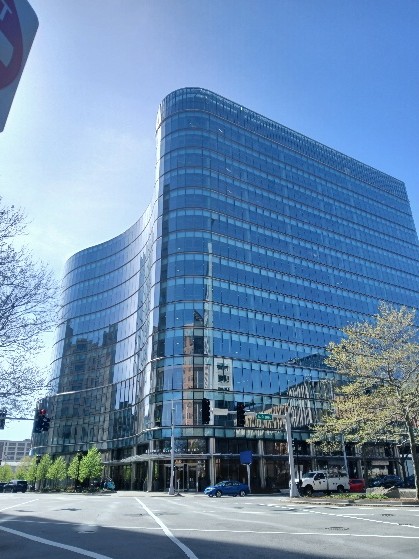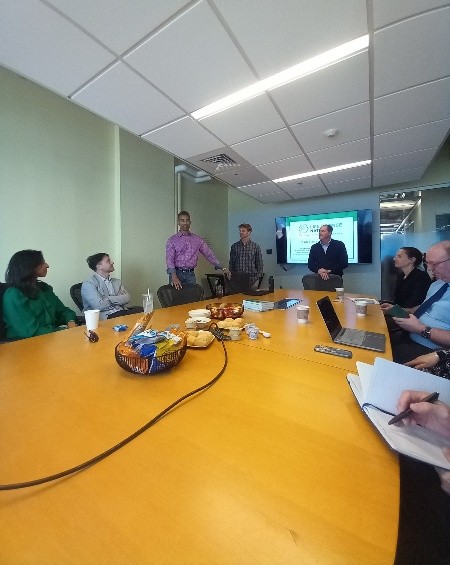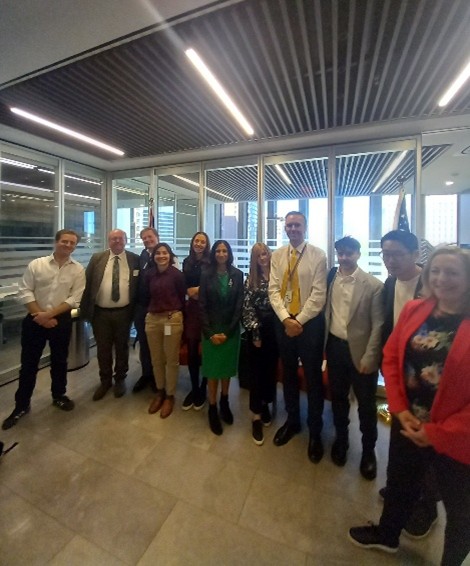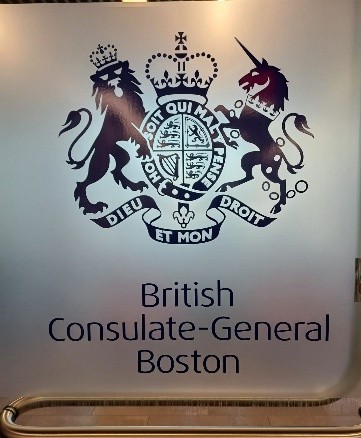by Alicia Gailliez, Business Development Manager, One Nucleus
 |
 |
At the end of April, a cohort of early-stage life science companies - Metrion Biosciences, PharmEnable Therapeutics, RNAvate and Tailor Bio - embarked on an intensive programme alongside One Nucleus and supporting sponsors, as well as Cellestial Health and OutSee, on a self-funded basis to join us. Having been selected as the winners of the One Nucleus Boston Bootcamp 2025 two months earlier, these companies began their journey to engage with the globally renowned Massachusetts (MA) life sciences ecosystem. The aims and objectives of the Boston Bootcamp initiative were previously outlined in the article ‘Why Boston, MA’, which highlights One Nucleus’ rationale behind choosing MA as the gateway to the US for the inaugural 2024 Bootcamp.
The 2025 (January-March) UK biotech financing report produced by the BioIndustry Association highlights recent major funding rounds for UK biotech companies, emphasising the vital role international investors play in supporting UK-based innovation. Notably, Isomorphic Labs raised £449 million entirely from non-UK investors to advance its AI-driven drug discovery efforts. Similarly, Verdiva Bio secured £327 million in Series A funding, also exclusively from international investors. These deals underscore a growing appetite among international investors to look beyond their own borders, especially towards highly innovative markets, such as the UK. Based on our own engagement with members at various One Nucleus roundtables, it is clear UK start-ups are increasingly considering a global mindset when it comes to raising capital. Ecosystems like Boston, with its deep investor base and thriving biotech network remain a critical hub for accessing capital, collaborations, and helping companies to accelerate their commercial growth.

Rather than providing a session-by-session breakdown, this article offers our wider ecosystem the chance to gain insights around the overarching learning themes from the visit. Sharing these key learnings is intended to help our members stay appraised of Boston’s relevant and evolving ecosystem.
Those interested in the full programme details for the 2025 Bootcamp can find them here.
Boston: A Thriving Life Sciences Ecosystem
One key takeaway from the trip was that Boston continues to demonstrate resilience as a global hub for life sciences, despite current challenges.

Several strengths of the Boston life sciences’ ecosystem were highlighted. These included a collaborative culture where industry players like BioMed Realty have a critical role in fostering strong tenant relationships and partnerships; robust funding from NIH (representing 6.6% of all US NIH funding in 2024, according to a report by Bostonplans.org), foundations and private capital sources; and a supportive infrastructure provided by organisations like MassBio that provide vital resources for start-ups and scale-ups, including meaningful ways to connect with other entrepreneurs at their annual Align Summit, MassBioDrive, CEO and Founder Network and Pharma Days.
As the Bootcamp participants reflected:
Jason Yip, Tailor Bio:
“What stood out for me most was how deeply biotech and entrepreneurship are embedded in the local education and research culture. Boston is clearly a place where research ideas become companies”.
Sophie Rose, Metrion Biosciences:
“I was excited to see a thriving life sciences ecosystem in Boston with a high need for specialist CRO services like those offered by Metrion. There is a collaborative and inclusive atmosphere at the Laboratory incubators where start-ups and more established small biotechs thrive in harmony”.
Hannah Sore, PharmEnable Therapeutics:
“Boston is thriving and one of the leading Life Sciences hubs in the world; with 18 of the top 20 big pharma present”.
Priya Mande, RNAvate:
“Student to entrepreneur to investor to company builders - has enabled a thriving and circular life science sector”.
Building Trust
Effective engagement with the MA ecosystem relies upon building trust and being present with regularity. Guest speakers Alice Sloan and Maryann Gallivan from Tunnell Consulting emphasised, “Trust takes time, and you need to show up consistently.”
Leveraging local networks for meaningful introductions was a recurring theme. For example, UK companies looking to build connections in the US should consider fractional staff or non-executive directors (NEDs) with local networks to help facilitate warm introductions. This is especially vital for building opportunities with investors and deal-makers.
Priya Mande noted, “Collaboration and networks are underpinned by an open advisor/broker ecosystem. Leveraging consultants is encouraged—perhaps in contrast to perceptions elsewhere.”
Hannah Sore reflected, “People and networks are crucial for success—that’s a key reason for Boston’s continued growth, even in tough times.”
Although happening in San Francisco, JPM Week was highlighted as a key opportunity for relationship building, particularly with potential investors and strategic partners.
The Value of Science-Led Innovation

To succeed in MA, companies must understand and respond to the needs of the market and incorporate this clearly into their messaging. There was a shared sense in the Intro to MA session that the MA ecosystem is not very forthcoming with expressing needs, there could be a role for organisations like One Nucleus to support companies in identifying these. Frugal innovation emerged as a differentiator, highlighting the ability of UK companies to do more with less.
Messaging matters for fundraising and a dynamic. An interactive session with Life Science Nation highlighted the importance of a clear executive summary, slide deck and one-pager. Getting your strapline right is a must in differentiating what you have to offer, and it needs to be specific, quickly clarifying what you do and why it matters in the eyes of your target audience.
Real Estate and Costs
Lab space availability in Boston has reached an all-time high. According to Bootcamp sponsors Cushman & Wakefield, with some areas of Boston seeing up to 50% vacancy. While not necessarily reflecting lower costs, this oversupply of space creates opportunities for new companies to move into high-quality existing space within a top-tier market, providing optimism about Boston’s potential for growth once the current funding challenges subside.
Despite the high vacancy rates, operational costs remain high; e.g., lab benches at LabCentral may cost $5K/month. However, this high cost is offset by Boston’s unparalleled access to world-class talent, proximity to major partners and investors, and global brand value. Cushman & Wakefield emphasised it is more important than ever for companies to begin planning their real estate strategy as early as possible to secure the best locations and terms.
Funding Environment: Fewer, Bigger Deals

The current fundraising landscape remains selective. As discussed during the Raising Investment session delivered by Gunderson Dettmer and Bootcamp sponsor Taylor Wessing, investor preferences are shifting toward clinical-stage companies with tangible products, rather than early-stage platforms. This reflects a broader appetite for larger, de-risked deals. According to KPMG’s Venture Pulse Q1 2025 report, the U.S. continues to lead as the top destination for venture capital investment, driven by several megarounds, including OpenAI’s $40 billion raise, Anthropic’s $4.5 billion across two closings, and Infinite Reality’s $3 billion round in the augmented reality space.
Priya Mande describes the impact on innovation: “Sadly, it is the patients in the more scientifically challenging disease indications and/or earlier stage innovators that will lose out if investment flows only to later de-risked clinical stage companies and /or fewer larger deals”.
The Role of Faculty in Start-ups
A unique aspect of Boston’s success is the involvement of senior faculty on founding and advisory boards. Professor Harvey Lodish, a biotechnology entrepreneur and advisor, noted during the group’s visit to the Whitehead Institute that this is not yet a model that is well replicated outside of Boston, including in the UK. Assembling the right advisory board early is crucial to a start-up’s trajectory.
Government and Institutional Support
|
 |
 |
The group visited the British Consulate-General in Boston and met with the Consul General to New England, David Clay, alongside colleagues from the Department for Business and Trade (DBT). DBT offers UK-based companies support to access and succeed in the MA market. These services play a crucial role in facilitating discussions and collaborations between UK businesses and potential partners within the New England ecosystem, including Boston.
While support is available, it was clear that the top priority among Bootcamp participants was getting direct access to relevant investors and partners. It was felt that greater clarity for the companies about how DBT operates and what it can and cannot offer would help enhance collaborations towards achieving both DBT’s and the companies’ performance goals.
Regulatory & Geopolitical Considerations

During an IP Strategy session with Bootcamp sponsors Wolf Greenfield and Mewburn Ellis, UK companies were encouraged to take a comprehensive approach to their IP strategy, beyond just patents. A successful IP strategy should clearly define how each type of IP will be secured and managed. It's important to evaluate freedom to operate and a well-considered licensing strategy to avoid common pitfalls.
Similarly, during an Operational session with Bootcamp sponsor RSM, outsourcing complex administrative functions like IT, HR and finance was encouraged as a highly efficient method for international companies. A third party can help to ensure compliance with strict cybersecurity and data privacy standards.
Expanding companies must also consider the geopolitical implications of the current climate on funding sources. US-China tensions may make taking Chinese investment today a downstream complication. However, the takeaway was the importance of securing funding now while understanding how shifting foreign investment policies may impact future opportunities. The dynamic in MA under new administration is one of cautious optimism. However, uncertainties exist, particularly around NIH funding cuts, changes to tariffs and impacts of changes at the FDA.
Building Bridges for One Nucleus Members
Through the experience of the Boston Bootcamp 2025, it became clear that success in this market depends on building trust, leveraging local networks, and delivering science-led innovation with clear, targeted messaging. While the funding landscape is increasingly selective, Boston has a supportive community that wants to be helpful.
Looking ahead, One Nucleus aims to build on these learnings to enhance support for our member companies looking to scale internationally. It is also a two-way effort; encouraging international investors and partners to look towards UK innovation is equally important in achieving the shared mission of driving scientific progress and ultimately improving patient outcomes globally, a core objective of One Nucleus’ vision.
One Nucleus is already continuing conversations with key stakeholders such as DBT while building visibility of our members at major global events such as BIO and RESI Boston whilst organising a range of satellite events and maintaining relationships with established networks like the Boston Bio Brits. Looking ahead, One Nucleus remains committed to exploring new opportunities for our members. Whether it’s replicating successful initiatives like the pitching session at last year’s Boston Biotech Week, or partnering with others to deliver pitch preparation sessions.
One Nucleus looks forward to exploring the key learnings above further during the closing panel at ON Helix 2025, moderated by Bootcamp sponsor CK Group.
